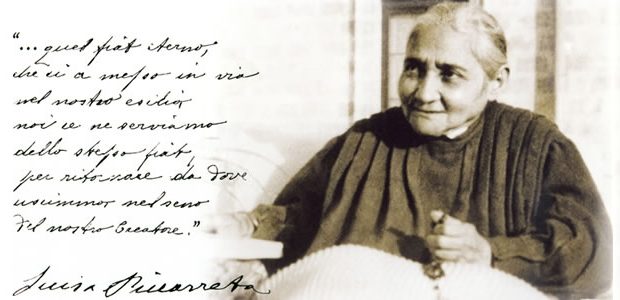St. Benedict is believe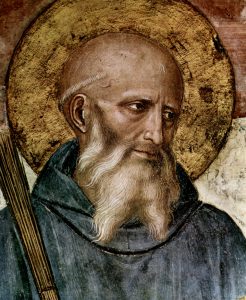 d to have been born around 480, as the son to a Roman noble of Norcia and the twin to his sister, Scholastica.
d to have been born around 480, as the son to a Roman noble of Norcia and the twin to his sister, Scholastica.
In the fifth century, the young Benedict was sent to Rome to finish his education with a nurse/housekeeper. The subject that dominated a young man’s study then was rhetoric — the art of persuasive speaking. A successful speaker was not one who had the best argument or conveyed the truth, but one who used rhythm, eloquence, and technique to convince. The power of the voice without foundation in the heart was the goal of the student’s education. And that philosophy was reflected in the lives of the students as well. They had everything — education, wealth, youth — and they spent all of it in the pursuit of pleasure, not truth. Benedict watched in horror as vice unraveled the lives and ethics of his companions.
Afraid for his soul, Benedict fled Rome, gave up his inheritance and lived in a small village with his nurse. When God called him beyond this quiet life to an even deeper solitude, he went to the mountains of Subiaco. Although becoming a hermit was not his purpose in leaving, there he lived as a hermit under the direction of another hermit, Romanus.
One day, during his time living in a cave above a lake as a hermit, the Devil presented Benedict’s imagination with a beautiful, tempting woman. Benedict resisted by rolling his body into a thorn bush until it was covered in scrapes. It is said through these body wounds, he cured the wounds of his soul.
After years of prayer, word of his holiness brought nearby monks to ask for his leadership. He warned them he would be too strict for them, but they insisted — then tried to poison him when his warning proved true. The story goes, the monks attempted to poison Benedict’s drink, but when he prayed a blessing over the cup – it shattered.
So Benedict was on his own again — but not for long. The next set of followers were more sincere and he set up twelve monasteries in Subiaco where monks lived in separate communities of twelve.
He left these monasteries abruptly when the envious attacks of another hermit made it impossible to continue the spiritual leadership he had taken.
But it was in Monte Cassin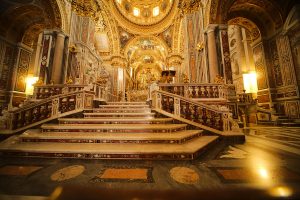 o he founded the monastery that became the roots of the Church’s monastic system. Instead of founding
o he founded the monastery that became the roots of the Church’s monastic system. Instead of founding 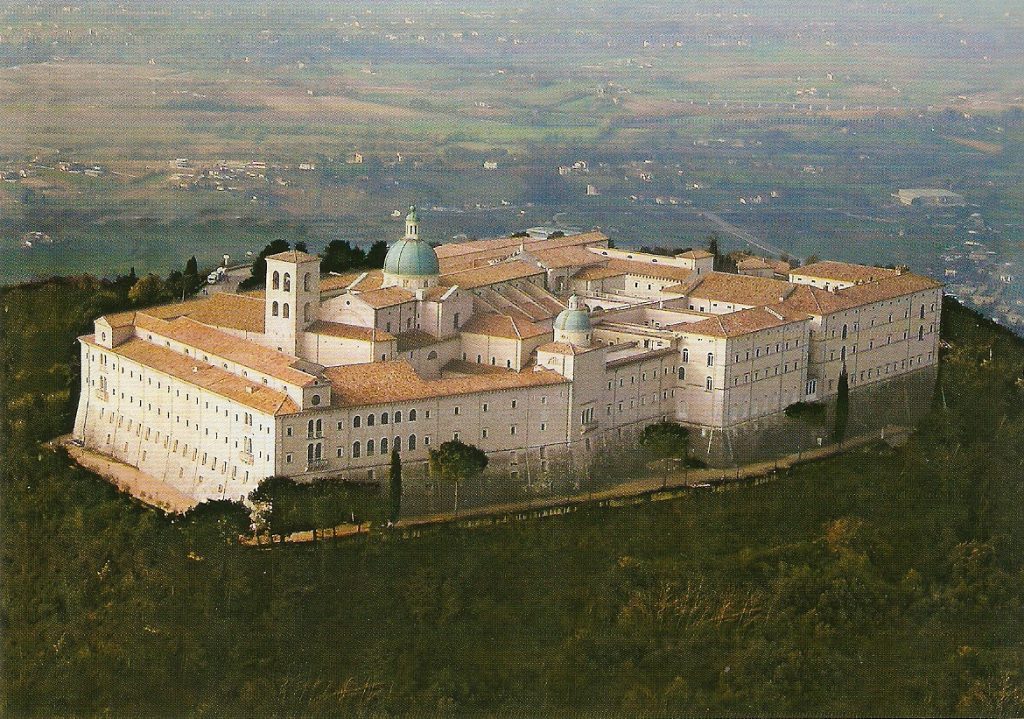 small separate communities he gathered his disciples into one whole community. His own sister, Saint Scholastica, settled nearby to live a religious life.
small separate communities he gathered his disciples into one whole community. His own sister, Saint Scholastica, settled nearby to live a religious life.
After almost 1,500 years of monastic tradition his direction seems obvious to us. However, Benedict was an innovator. No one had ever set up communities like his before or directed them with a rule. What is part of history to us now was a bold, risky step into the future.
Benedict had the holiness and the ability to take this step. His beliefs and instructions on religious life were collected in what is now known as the Rule of Saint Benedict — still directing religious life after 15 centuries.
In this tiny but powerful Rule, Benedict put what he had learned about the power of speaking and oratorical rhythms at the service of the Gospel. He did not drop out of school because he did not understand the subject! Scholars have told us that his Rule reflects an understanding of and skill with the rhetorical rules of the time. Despite his experience at school, he understood rhetoric was as much a tool as a hammer was. A hammer could be used to build a house or hit someone over the head. Rhetoric could be used to promote vice … or promote God. Benedict did not shun rhetoric because it had been used to seduce people to vice; he reformed it.
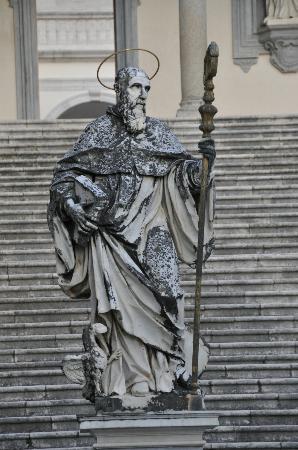 Benedict did not want to lose the power of voice to reach up to God simply because others had use it to sink down to the gutter. He reminded us “Let us consider our place in sight of God and of his angels. Let us rise in chanting that our hearts and voices harmonize.” There was always a voice reading aloud in his communities at meals, to receive guests, to educate novices. Hearing words one time was not enough — “We wish this Rule to be read frequently to the community.”
Benedict did not want to lose the power of voice to reach up to God simply because others had use it to sink down to the gutter. He reminded us “Let us consider our place in sight of God and of his angels. Let us rise in chanting that our hearts and voices harmonize.” There was always a voice reading aloud in his communities at meals, to receive guests, to educate novices. Hearing words one time was not enough — “We wish this Rule to be read frequently to the community.”
Benedict realized the strongest and truest foundation for the power of words was the Word of God itself: “For what page or word of the Bible is not a perfect rule for temporal life?” He had experienced the power of God’s word as expressed in Scripture: “For just as from the heavens the rain and snow come down and do not return there till they have watered the earth, making it fertile and fruitful, giving seed to him who sows and bread to him who eats, so shall my word be that goes forth from my mouth; It shall not return to me void, but shall do my will, achieving the end for which I sent it” (Isaiah 55:10-11).
For prayer, Benedict turned to the psalms, the very songs and poems from the Jewish liturgy that Jesus himself had prayed. To join our voices with Jesus in praise of God during the day was so important that Benedict called it the “Work of God.” And nothing was to be put before the work of God. “Immediately upon hearing the signal for the Divine Office all work will cease.” Benedict believed with Jesus that “One does not live by bread alone, but by every word that comes forth from the mouth of God’ ” (Matthew 4:4).
But it wasn’t enough to just speak the words. Benedict instructed his followers to practice sacred reading — the study of the very Scriptures they would be praying in the Work of God. In this lectio divina, he and his monks memorized the Scripture, studied it, and contemplated it until it became part of their being. Four to six hours were set aside each day for this sacred reading. If monks had free time it “should be used by the brothers to practice psalms.” Lessons from Scripture were to be spoken from memory not read from a book. On Benedict’s list of “Instruments of Good Works” is “to enjoy holy readings.”
In one story of Benedict’s life, a poor man came to the monastery begging for a little oil. Although Benedict commanded that the oil be given, the cellarer refused — because there was only a tiny bit of oil left. If the cellarer gave any oil as alms there would be none for the monastery. Angry at this distrust of God’s providence, Benedict knelt down to pray. As he prayed a bubbling sound came from inside the oil jar. The monks watched in fascination as oil from God filled the vessel so completely that it overflowed, leaked out beneath the lid and finally pushed the cover off, cascading out on to the floor.
In Benedictine prayer, our hearts are the vessel empty of thoughts and intellectual striving. All that remains is the trust in God’s providence to fill us. Emptying ourselves this way brings God’s abundant goodness bubbling up in our hearts, first with an inspiration or two, and finally overflowing our heart with contemplative love.
Benedict died on 21 March 543, not long after his sister. It is said he died with high fever on the very day God told him he would. He is the patron saint of Europe and students.
Feast Day of SAINT BENEDICT
Abbot
INTROIT Ps. 25:11-12
Redeem me, O Lord, and have pity on me, for my foot stands on the right path. In the assemblies I will bless the Lord.
Ps. 25:1. Do me justice, O Lord, for I have walked in innocence, and in the Lord I trust without wavering.
V. Glory be . . .
COLLECT
O Almighty God, while Your servants mortify their bodies by fasting, may they also follow after righteousness and avoid sin. Through Our Lord . . .
Let the blessed Abbot Benedict intercede for us, O Lord. May his prayers win us Your help, since our own actions cannot merit it. Through Our Lord . . .
LESSON Dan. 9:15-19
In those days, Daniel prayed to the Lord, saying, “O Lord, our God, who hast brought forth thy people out of the land of Egypt, with a strong hand, and hast made thee a name as at this day: we have sinned, we have committed iniquity, O Lord, against all thy justice: let thy wrath and thy indignation be turned away, I beseech thee, from thy city, Jerusalem, and from thy holy mountain. For by reason of our sins, and the iniquities of our fathers, Jerusalem, and thy people, are a reproach to all that are round about us.
“Now, therefore, O our God, hear the supplication of thy servant, and his prayers: and shew thy face upon thy sanctuary, which is desolate, for thy own sake. Incline, O my God, thy ear, and hear: open thy eyes, and see our desolation, and the city upon which thy name is called: for it is not for our justifications that we present our prayers before thy face, but for the multitude of thy tender mercies. O Lord, hear: O Lord, be appeased: hearken, and do: delay not, for thy own sake, O my God: because thy name is invocated upon thy city, and upon thy people.”
GRADUAL Ps. 69:6, 3
Help me and deliver me, O Lord, make no delay! V. Let my enemies who seek my life be put to shame and confounded.
TRACT Ps. 102:10; 78:8-9
O Lord, repay us not according to the sins we have committed, nor according to our iniquities. V. O Lord, remember not our iniquities of the past; let Your mercy come quickly to us, for we are being brought very low. (All kneel.) V. Help us, O God our Savior, and for the glory of Your name. O Lord, deliver us; and pardon us our sins for Your name’s sake.
GOSPEL John 8:21-29
At that time, Jesus said to them: “I go: and you shall seek me. And you shall die in your sin. Whither I go, you cannot come.” The Jews therefore said: “Will he kill himself, because he said: Whither I go you cannot come?”
And he said to them: “You are from beneath: I am from above. You are of this world: I am not of this world. Therefore I said to you that you shall die in your sins. For if you believe not that I am he, you shall die in your sin.” They said therefore to him: “Who art thou?” Jesus said to them: “The beginning, who also speak unto you. Many things I have to speak and to judge of you. But he that sent me, is true: and the things I have heard of him, these same I speak in the world.” And they understood not that he called God his Father.
Jesus therefore said to them: “When you shall have lifted up, the Son of man, then shall you know that I am he and that I do nothing of myself. But as the Father hath taught me, these things I speak. And he that sent me is with me: and he hath not left me alone. For I do always the things that please him.”
OFFERTORY Ps. 15:7, 8
I bless the Lord, who has given me understanding. I set the Lord ever before me; with Him at my right hand I shall not be disturbed.
SECRET
O Lord, protect us through this sacrifice which we offer to atone for our sins and to give glory to You. Through Our Lord . . .
Commemoration of SAINT BENEDICT
Accept this offering which we humbly present in honor of Your Saints, O God, and through it purify our bodies and our souls. Through our Lord . . .
COMMUNION ANTIPHON Ps. 8:2
O Lord, our Lord, how glorious is Your name over all the earth!
POSTCOMMUNION
O Lord, may this Communion cleanse us from sin, and bestow upon us spiritual health from heaven. Through Our Lord . . .
Commemoration of SAINT BENEDICT
Almighty God, we pray that the reception of this Bread of Heaven may strengthen us against all adversity through the intercession of Your blessed Confessor Benedict. Through our Lord . . .
PRAYER OVER THE PEOPLE
Hear our petitions, O Almighty God. Your love has given us hope; let Your unfailing mercy protect us. Through our Lord . . .
From The Book of Heaven
Volume 25 – 10.10.28
Then, as I am near my Jesus in the Sacrament, every morning there is benediction with the Most Holy One, and while I was praying my sweet Jesus to bless me, moving in my interior, He told me: “My daughter, I bless you with my whole Heart; even more, I bless my very Will in you, I bless your thoughts, breaths and heartbeats, that you may think always about My Will, may breath It continuously, and My Will alone may be your heartbeat. And for love of you I bless all human wills, that they may dispose themselves to receive the Life of my Eternal Volition. Dearest daughter of mine, if you knew how sweet it is, how happy I feel in blessing the little daughter of My Will…. My Heart rejoices in blessing she who possesses the origin, the Life of Our Fiat, which will bring about the beginning, the origin of the Kingdom of my Divine Will. And while I bless you, I pour in you the beneficial dew of the light of my Divine Volition which, making you all shining, will make you appear more beautiful to my sacramental gazes; and I will feel happier in this cell, gazing at my little prisoner daughter, invested and bound by the sweet chains of My Will. And every time I bless you, I will make the Life of my Divine Volition grow in you. How beautiful is the company of one who does my Divine Will. My Will brings into the depth of the soul the echo of everything I do in this Holy Host, and I do not feel alone in my acts – I feel that she is praying together with Me; and as our supplications, our sighs, unite together, we ask for one same thing – that the Divine Will be known and that Its Kingdom come soon.”
Volume 25 – 11.4.28
After this, benediction was given with the Most Holy Sacrament, and I prayed Him from the heart to bless me; and Jesus, moving in my interior, echoing what Jesus in the Sacrament was doing, raised His blessed right hand in the act of blessing me, and told me: “My daughter, I bless your heart, and I seal my Divine Will in it, so that your heart, united with my Divine Will, may palpitate in all hearts, so that you may call all hearts to love It. I bless your thoughts, and I seal my Divine Will in them, that you may call all intelligences to know It. I bless your mouth, so that my Divine Will may flow in your voice, and you may call all human voices to speak about my Fiat. I bless all of you, my daughter, so that everything may call my Divine Volition in you, and you may run to all in order to make It known. O! how much happier I feel in operating, praying, blessing in one in whom My Will reigns. In this soul I find my life, the light, the company; and everything I do arises immediately, and I see the effects of my acts; and I am not alone if I pray, if I operate, but I have company, and one who works together with Me. On the other hand, in this sacramental prison, the accidents of the host are mute, they say not a word to Me, I do everything on my own, I feel not a sigh which would unite to mine, nor a heartbeat which would love Me. On the contrary, there is the cold of a sepulcher for Me, which not only keeps Me in prison, but buries Me, and I have no one to whom to say a word, nor anyone with whom to pour Myself out; because the host does not speak, I am always in silence, and with divine patience I wait for hearts that receive Me, so as to break my silence and enjoy a little bit of company. And in the soul in whom I find my Divine Will I feel Myself repatriated in the Celestial Fatherland….”
Fiat!
